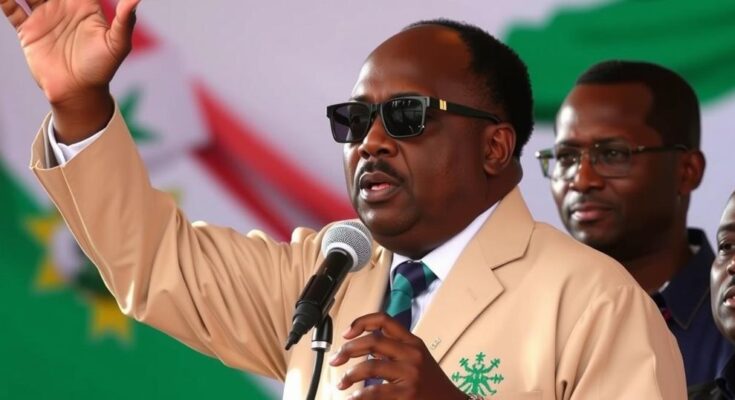Chad’s ruling Patriotic Salvation Movement won the parliamentary elections with 124 out of 188 seats amid a boycott from opposition parties, achieving a 51.5% voter turnout. The election aimed to finalize Chad’s transition to democracy, yet opposition criticism of its legitimacy persists alongside security challenges. President Deby emphasized decentralization in the electoral process, despite ongoing skepticism regarding the political climate.
Chad’s ruling party, the Patriotic Salvation Movement, secured a significant victory in the parliamentary elections held last month, achieving 124 out of 188 available seats. This election, the first in over a decade, was marked by a boycott from the primary opposition parties, which included more than ten groups, notably the Transformers party. The elections reportedly drew a voter turnout of 51.5%, yet the opposition criticized the process as non-credible, calling it a ‘charade.’
This electoral outcome is seen as pivotal in solidifying President Mahamat Idriss Deby’s political authority, especially following his controversial assumption of power as a military leader in 2021 after the death of his father, former president Idriss Deby Itno. The current election was conducted in conjunction with regional and municipal elections, intended to signal the final stage of the country’s transition towards democracy.
President Deby promoted the election as a means to enable decentralization and distribute authority across various governmental levels, reflecting a commitment to the aspirations of the Chadian populace. However, concerns persist regarding the credibility of the electoral process, especially in light of previous disputed elections and ongoing security challenges against militant groups like Boko Haram.
Chad faces critical security issues, notably militant attacks in the Lake Chad region and recent tensions with France, a longstanding military ally. The election results could have significant implications for the country’s political stability and governance in the coming years, particularly as the government seeks to navigate these complex challenges and reshape its political landscape.
Despite the absence of comments from the primary opposition regarding the election results, their prior dismissals highlight a profound skepticism towards the current political environment in Chad, raising questions about future engagement in the political process.
Chad has a tumultuous political history, with recent changes in leadership following the death of long-term president Idriss Deby Itno in 2021. Mahamat Idriss Deby ascended to power as the head of a military council, declaring intentions to lead Chad towards democratic governance. The parliamentary elections that recently took place are seen as crucial for transitioning towards a more decentralized political system, aimed at distributing governmental power. However, skepticism remains surrounding the electoral integrity and broader governance issues, further exacerbated by ongoing security threats and strained international relations.
The parliamentary elections in Chad have yielded a decisive victory for the ruling Patriotic Salvation Movement, amid a boycott by opposition parties questioning the legitimacy of the electoral process. This critical moment in Chad’s political evolution underscores the challenges of transitioning to a democratic framework, with lingering doubts over the electoral integrity and significant security dilemmas. Moving forward, the outcomes of these elections could play a vital role in shaping Chad’s future political landscape, amid the concerns raised by the opposition and ongoing regional conflicts.
Original Source: abcnews.go.com




